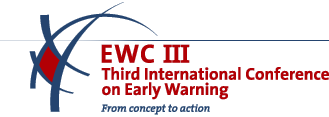|
Moderator: Mishal Husain
09.00 Overarching Issue: National warning systems for all hazards and all people
Welding the best palyers into the best team for the best results: politicians, hazard experts, dsaster authorities, media, community leaders.
Keynote: Barbara Carby (Director, Office of Disaster Preparedness and Emergency Management, Kingston, Jamaica)
09.30 Session 2: WATER
Too much or little - coping with the hazards of Water
Participants will be presented with the following projects to illustrate problems and solutions related to climate risks, floods and tsunamis:
- Enhancing Hydroclimate Monitoring, Early Warning and Applications for the Reduction of Climate Related Risks in the Greater Horn of Africa, submitted by the IGAD Climate Prediction and Applications Centre
- Implementing a Real-Time Flood Forecasting System for East Black Sea Region in Turkey, submitted by the General Directorate of State Hydraulic Works
- Towards a Multi-Hazard Early Warning and Response System in West Afriva, submitted by the World Meteorological Organization
- Early Warning Systems for Natural Hazards in the Binational River Basin Catamayo-Chira, submitted by the Provincial Council of Loja, Ecuador and the Regional Government of Piura, Peru
- Establishment of an Information Chain to Influence the Behaviour of Populations Exposed to Atmospheric and Geological Risks (Cyclones and Tsunamis) in the Caribbean Basin and the Atlantic Ocean, with a View to Reducing their Vulnerability, submitted by Victorin Lurel (the President of the Regional Council of Guadaloup) and Pierre-Marie Sarrant (CORISK), PIRAC
Inputs from experts and participants will be invited as before, and the moderator will draw conclusions and features for the outcome documents.
|
09.00 Session 2: MEGA-EVENTS
Keynote: Istanbul earthquake early warning and rapid response system,
by Mustafa Erdik et al.
In this session, participants will hear eight short presentations on mega-events in different parts of the world, related to a variety of subjects that are directly related to early warning of mega-events in different natural hazards. A discussion panel will conclude the session. |
|
15.00 Session 2, cont.
16.00 Session 3: AIR
Weather eyes open - predicting and responding to the hazards of the Air
Moderator: Sir Trevor Mc Donald
During this session, the following projects will be presented, to illustrate problems and solutions related to drought and desertification, storms and climate risks:
- Development of a Regional Sand and Dust Storm Early Warning System in North East Asia, submitted by the Centre for Atmosphere Watch and Services, China Meteorological Administration and the World Meteorological Organization
- Early Warning Communication System for the Kingdom of Tonga, submitted by the Tonga National Disaster Management Office
- Development of an Advanced Tropical Cyclone Early Warning System for the Philippines, submitted by the Philippine Atmospheric, Geophysical and Astronomical Services Administration; City University of Hong Kong; Bureau of Meteorolgy, Australia; and the World Meteorological Organization
- Early Warning Systems for Desert Locusts – a West Africa Pilot Project, submitted by National Meteorlogical Services of Senegal and Mauritania, WMO, and the Institute of Biometeorology of Florence, Italy
Experts in relevant areas will contribute to the presentations and participants will be invited and encouraged to take part in the discussions. The moderator will draw features that will deserve to be brought into the conference outcome documents.
|
15.00 Session 3: PEOPLE, POLITICS AND ECONOMICS
Keynote: Cost-effective strengthening of warnings through informal networks and channels,
by John Handmer
In this session, participants will be presented with nine short interventions to discuss early warning from a socioeconomic and political perspective. Experiences from different parts of the world will be brought by the participants to enrich the discussion panel that will conclude the session. |

